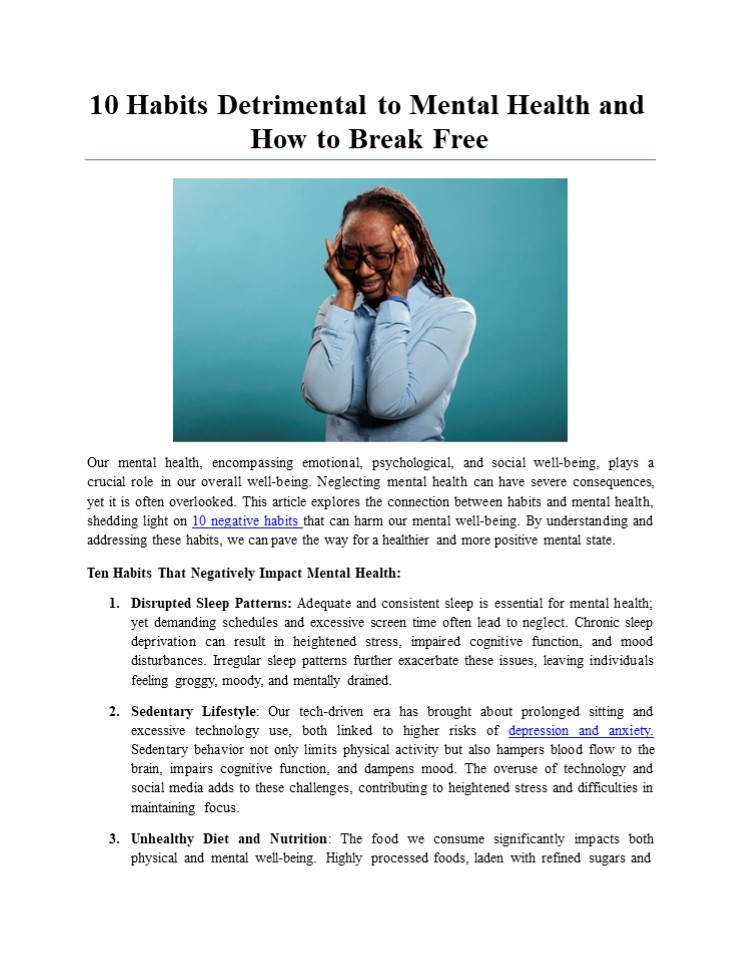10 Habits Detrimental to Mental Health and How to Break Free - PowerPoint PPT Presentation
Title:
10 Habits Detrimental to Mental Health and How to Break Free
Description:
This article explores the connection between habits and mental health, highlighting ten negative behaviors such as disrupted sleep, sedentary lifestyles, unhealthy diet, chronic stress, social isolation, and more. It emphasizes the need to recognize and address these habits for a healthier mental state. The article concludes by stressing the importance of prioritizing self-care, seeking support, and cultivating positive habits for improved mental well-being. – PowerPoint PPT presentation
Number of Views:0
Date added: 23 November 2023
Slides: 3
Provided by:
YourPsychologist
Category:
Medicine, Science & Technology
Tags:
Title: 10 Habits Detrimental to Mental Health and How to Break Free
1
10 Habits Detrimental to Mental Health and How
to Break Free
- Our mental health, encompassing emotional,
psychological, and social well-being, plays a
crucial role in our overall well-being.
Neglecting mental health can have severe
consequences, yet it is often overlooked. This
article explores the connection between habits
and mental health, shedding light on 10 negative
habits that can harm our mental well-being. By
understanding and addressing these habits, we
can pave the way for a healthier and more
positive mental state. - Ten Habits That Negatively Impact Mental Health
- Disrupted Sleep Patterns Adequate and consistent
sleep is essential for mental health yet
demanding schedules and excessive screen time
often lead to neglect. Chronic sleep deprivation
can result in heightened stress, impaired
cognitive function, and mood disturbances.
Irregular sleep patterns further exacerbate these
issues, leaving individuals feeling groggy,
moody, and mentally drained. - Sedentary Lifestyle Our tech-driven era has
brought about prolonged sitting and excessive
technology use, both linked to higher risks of
depression and anxiety. Sedentary behavior not
only limits physical activity but also hampers
blood flow to the brain, impairs cognitive
function, and dampens mood. The overuse of
technology and social media adds to these
challenges, contributing to heightened stress and
difficulties in maintaining focus. - Unhealthy Diet and Nutrition The food we consume
significantly impacts both physical and mental
well-being. Highly processed foods, laden with
refined sugars and
2
- unhealthy fats, have been associated with an
elevated risk of mental health issues.
Additionally, excessive caffeine and alcohol
intake can disrupt sleep patterns, increase
anxiety, and negatively affect mood. - Chronic Stress and Poor Coping Mechanisms
Chronic stress is prevalent in today's society,
posing a significant threat to mental health.
Unhealthy coping mechanisms, such as excessive
alcohol or drug use, emotional eating, and
self-isolation, may provide temporary relief but
worsen underlying mental health issues, creating
a harmful cycle. - Social Isolation and Lack of Support Human
beings thrive on social connections, and social
isolation can deeply harm mental well-being,
fostering loneliness and worthlessness.
Cultivating meaningful social connections is
crucial, while recognizing and distancing
oneself from toxic relationships is essential for
preserving mental health. - Neglecting Self-Care Prioritizing self-care is
crucial for optimal mental health. Neglecting
personal well-being in favor of others can lead
to burnout and increased stress. Engaging in
relaxation, hobbies, and mindfulness reduces
stress, enhances mood, and fosters a positive
mindset. - Lack of Mental Stimulation and Creativity
Engaging in activities that challenge and
stimulate the mind is crucial for maintaining
optimal mental health. Incorporating creativity
into our lives allows us to tap into our innate
potential, fostering a positive mindset and
supporting mental health. - Negative Self-Talk The Internal Saboteur
Negative self-talk erodes self-esteem and
contributes to the development of mental health
issues. Recognizing and challenging these
negative thought patterns is crucial for
promoting a positive self-image. - Overcommitting The Perils of Saying 'Yes' to
Everything Constantly saying 'yes' to every
opportunity or request can lead to excessive
stress, burnout, and a depletion of mental and
emotional resources. Learning to set boundaries
and prioritize self-care is essential for
preserving mental well-being. - Unhealthy Coping Mechanisms Escaping Rather Than
Confronting Seeking escape through unhealthy
coping mechanisms provides temporary relief but
fails to address underlying issues. Confronting
and processing emotions in healthy ways, such as
seeking therapy or practicing mindfulness, is
vital for long-term mental well-being. - Conclusion
- Breaking free from these 10 harmful habits
requires effort, but the rewards for mental
well-being are worth it. Prioritizing self-care,
seeking support, and cultivating healthier habits
pave the way for a happier, more balanced, and
mentally resilient life. Your mental health
matters, and taking these steps is the first
towards nurturing it.

